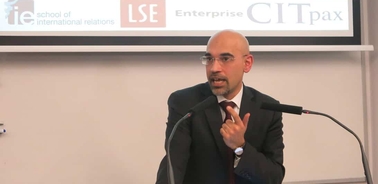- Home
- Ie School Of International Relations Hosts The Lecture “iran And Europe: Friend Or Foe?” By Dr. Rouzbeh Parsi
IE School of International Relations hosts the lecture “Iran and Europe: Friend or Foe?” by Dr. Rouzbeh Parsi

On Thursday February 13th, the IE School of International Relations, with the collaboration of the Toledo International Centre for Peace (CITpax), had the honor of hosting the lecture “Iran and Europe: Friend or Foe?” given by Dr. Rouzbeh Parsi. Dr. Parsi is Senior Lecturer in the Department of Human Rights at Lund University, Director of the European Iran Research Group and former a Senior Analyst at the EU Institute for Security Studies (2009-2013).
After the institutional presentation by Dean de Areilza and Ambassador Casinello, Director General of CitPax, Dr. Emma Hooper introduced the theme of the lecture: the EU- Iran relationship.
Dr. Parsi began his lecture with a historic overview of Iran, starting with the revolution of 1979. He defined the term revolution and its consequences, which is usually exemplified by the wish to spread ideals, such as in the Russian Revolution. In his introduction Dr. Parsi highlighted the incongruity of the term Islamic Republic. Iran is neither purely a Theocracy nor is it a Republic. This is because the revolution did not have a religious origin. If they remove the term Republic, then they would have to renounce the revolution as well. Hence the inherent contradiction in the name.
After these preliminary words, Dr. Parsi discussed modern Iran. He believes that the Islamic republic is a post-revolutionary state that “everyone considers to be predictable but the truth is that every time there is a presidential election everyone is surprised by the person elected”. He supported this argument by giving the example of how the Iranian government dealt with the crisis in Bahrain, preferring to keep ties with the Sunni regimen instead of supporting its Shiite counterparts.
Dr. Parsi then discussed the defense situation of Iran. He considers it to be quite weak without an air force and with a non-existing fleet which was bombed by the US in the 80s. The Iranian situation has nothing to do with that of Egypt. Using an XVIII century Prussian quote to illustrate this point, he stated that Egypt was “not a state with an army but an army with a state”. The fact that after 18 years the Iran nuclear program remains in its infancy demonstrates how controversial this theme is in domestic politics.
The last part of the lecture was dedicated to Iran–EU international relations, which used to be quite good until the UN sanctions. Because of its proximity the EU was a closer commercial partner to Iran than the US. EU has always followed US policy on the Middle East. Here lies the main issue as US is not clear in foreign affairs. For instance the Obama administration wants to lift Iranian sanctions but the Republican Party controlled Congress is against it. The EU works as an intermediary in the US-Iran relations. Dr. Parsi concluded his lecture stating “officially neither of them wants to reestablish relations, but in reality both of them are looking forward to it”.
At the end of the conference the floor was opened to questions. Most of them addressed Iranian foreign policy, the US Democratic Party split over the issue and the role of Israel.